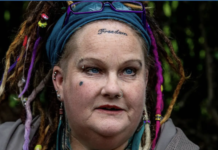
Greenpeace have used six tonnes of dairy sewage to blockade ACC’s multi-storey building in the middle of Wellington.
Just after 6.45am, six thousand litres of cow urine and other dairy waste, sealed in eight heavy-duty tanks, were placed across the two main entrances into ACC’s offices on Molesworth Street in an escalating row over the government department’s link to the controversial Ruataniwha irrigation scheme in Hawke’s Bay.
Critics of the scheme say that large-scale irrigation projects lead to industrial dairy expansion, which leads to increased river pollution.
Three signs saying ‘Save Our Rivers’ are adorning the near-tonne containers, alongside warning signs signalling the contents.
The tanks, known as IBCs, or intermediate bulk containers, are industrial containers specifically designed for transporting and storing large amounts of liquids.
Big investors, including Ngai Tahu and Trustpower, have deserted the Ruataniwha scheme, leaving government departments, such as ACC, to plug the multi-million dollar funding gap if the project is to be completed.
Last month, a report commissioned by Hawke’s Bay Regional Council examining the economics of the irrigation plan revealed that costs have climbed significantly, and are set to soar to over $900 million.
Genevieve Toop, Greenpeace’s agriculture campaigner, said: “ACC looks set to throw away millions of dollars on the controversial Ruataniwha dam which will pollute our precious rivers. And that’s just taking the piss.
“So we’ve blockaded ACC’s offices in Wellington today with six tonnes of dairy sewage, including cow piss, in large, sealed containers. Millions of tonnes of pollution ends up in our rivers via cow piss already. And this pollution will only get worse if government departments like ACC throw taxpayers’ money at irrigation schemes like Ruataniwha that expand the industrial dairy sector.
“Ecological farming is much better for our rivers, our land and our international reputation. It’s this that the government should be backing, not some failed industrial agriculture model which is polluting our rivers.”
Over 20,000 people have signed a Greenpeace petition calling on the government to stop funding industrial scale irrigation, like the plans at Ruataniwha and the Central Plains Water Scheme in Canterbury.
Earlier this week, Greenpeace took out a full-page advert in The Press newspaper targeting Central Plains Water, and calling for the scheme to be dropped.






Oh my, my, my…
http://www.stuff.co.nz/business/farming/79590288/greenpeace-uses-dairy-sewage-in-wellington-protest
Well done Greenpeace….
This goverment is like Germany during World War II in that it is using all available finances it controls to fund the dairy industry.
Nice
http://www.radionz.co.nz/news/regional/303003/litres-of-urine-dumped-in-central-wgtn
“Unclean-Ungreen NZ” should be the top motto now around the world for NZ from today.
This is because also (below) another water pollution issue has been announced on this 4th May 2016 same morning.
This terrible Wairoa drinking water pollution contaminated incident caused by Eastland Community trust , and Gisborne District Council reached my ears!!!
http://www.radionz.co.nz/news/regional/302985/waihi-dam-breached-consent-for-years
A Radio NZ report also released shows that Gisborne District Council knew Waihi Dam in Wairoa had breached Resource consent.
Kate Gudsell -Environment Reporter kate.gudsell@radionz.co.nz
A company whose damaged dam poured silt into Wairoa waterways for months over summer had been breaching its resource consent for years, and the enforcer, the Hawkes Bay Regional Council, was aware since 2013.
The privately-owned Waihi Dam has taken months to be fixed.
A sluice gate at Eastland Group’s Waihi dam was damaged last September and was not fixed until March, costing the Wairoa District Council more than $100,000 to clean up the area’s drinking water.
The Waihi dam consent was issued in 1979, predating the Resource Management Act, and has remained unchanged since some tweaks in 1985.
In 1999 it was transferred to Eastland Network, the electricity arm of Gisborne-based Eastland Group.
As part of the consent, Eastland was required to carry out sediment surveys every two years and an ecological survey every year.
Documents released to RNZ News show that in 2013 the regional council requested copies of both these surveys.
It received one sediment survey, but not until September 2014, and no ecological surveys because Eastland had not carried any out.
The regional council said the company had breached its consent in respect of the surveys, but no penalties were incurred.
Sheena Martin holds a bottle of the dirty, silty water from the Waihi Dam.
Sheena Martin holds a bottle of the dirty, silty water from the Waihi Dam earlier this year. Photo: RNZ/Kate Gudsell
Sheena Martin’s farm draws water from the affected waterways and she said the silt had destroyed her whole summer.
She said financially they would never catch up on what they had lost.
Ms Martin was not surprised to learn the consent had been breached and there had been no penalties and said she was disgusted with the whole system.
“There’s been hundreds of thousands spent by our group over the years to have that water, and some arrogant company and obviously inefficient regional council set up can just destroy it.”
The silt situation has been described as an environmental disaster by many people, including the regional council’s chair, Fenton Wilson.
Mr Wilson did not return RNZ’s calls.
Wairoa District Council chief executive Fergus Power said the silt had been catastrophic, and ratepayers were picking up the bill because the local council had to clean up drinking water.
The council would be seeking to recover those costs from Eastland.
“There’s no reason why the ratepayer should be paying for the consequences of a dam failure of this scale.”
Mr Power did not want to put a precise figure on what it had cost the district council, but said it was more than $100,000.
Environmental Defence Society senior policy analyst Marie Brown described the regional council’s approach to monitoring and enforcement as ‘languid’ and suggested a lack of attention from the regional council.
“Particularly when you look at the situation that’s then transpired of quite significant sediment discharge into a really important fresh water area.
“It really shows that the cost of monitoring and enforcement, when it’s not well done, really do fall to the community ultimately.”
Green Party water spokesperson Catherine Delahunty said the situation showed that neither the company or council took their responsibilities seriously.
“The company has been allowed to behave badly with no consequences so both organisations have to be held accountable for what has been an ecological disaster, as the people said, their summer was stolen, their river was full of silt, their pumps are blocked up, and they feel that no one’s being held to account and this was before people knew that there has been no proper consent and no proper monitoring.”
Wairoa Mayor Craig Little said it made a mockery of the consenting system.
He was concerned Wairoa would be collateral damage once the regional council completed its investigation into the damaged dam and Eastland Group’s response to it.
Hawkes Bay Regional Council and Eastland both declined to comment on the breach until the investigation is complete, which is expected to be at the end of this month.
However, Eastland Group said it had been in communication with the regional council during the years it had owned the dam and believed it had met the consent requirements.
Wairoa mayor Craig Little by the Waihi Dam
+100
http://www.radionz.co.nz/news/regional/303003/litres-of-urine-dumped-in-central-wgtn
Yes great exposure here Greenpeace!
And also released today (see link below) was the story of Gisborne District Council and their local ECT holding of a Wairoa Dam broken has now polluted all Wairoa’s drinking water as they did not have a resource consent and HBRC had warned them several times to fix the leaking dam but never fixed it till best part of a year later. Awful falling standards we have under this government now we are getting a very bad name such as Unclean-ungreen NZ ”
http://www.radionz.co.nz/news/regional/302985/waihi-dam-breached-consent-for-years
Well done, Greenpeace! You are the conscience of our wasteful, consumerist society.
Comments are closed.